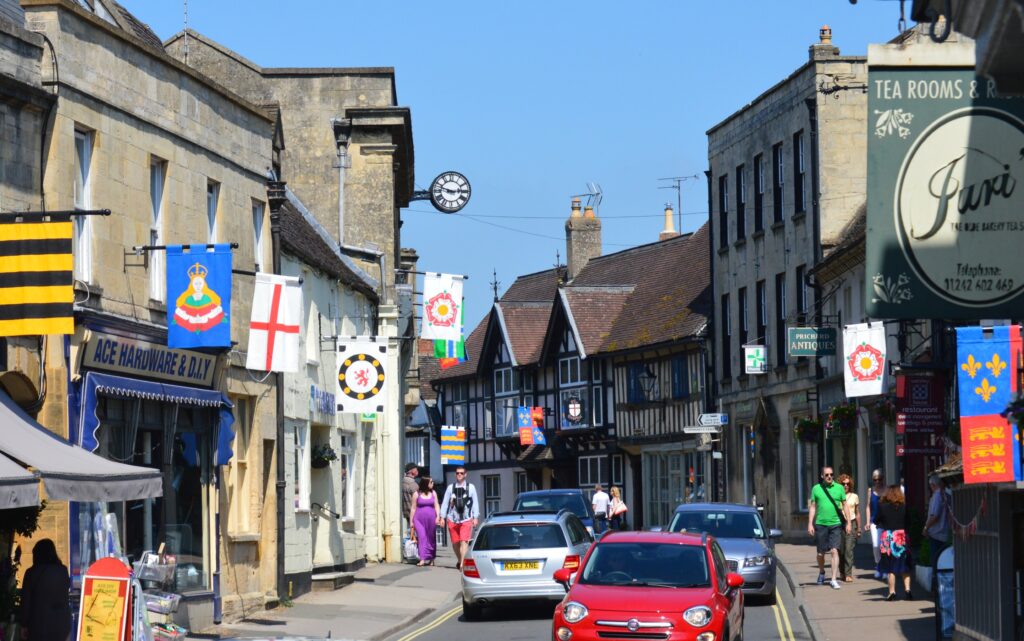
Dan Keech is teaming up with former CCRI colleague, Owain Jones, (now Professor of Environmental Humanities at Bath Spa University) at a workshop at Trinity College, Dublin, on 1st to 3rd March, talking about urban ruins.
They are giving a talk about the rhizomic agency of ruins by looking at how they feature in World Heritage designations, in literature about the aftermath of the Second World War and as a relic of the Cold War.
The presentation, entitled ‘Narratives within urban ruins: World Heritage, World War, Cold War’, will focus on three cities – Bath, London and Tallin. It will examine how different narrative configurations reveal the material, narrative and temporal dynamism of urban ruins and land use. In Bath, ghosts of a lost horticultural industry survive in street names and archives. Ecocide in the surrounding country spurs local activists to resurrect food growing even while the ‘dolls parlour’ of Georgian facades crowd out other narratives the city conceals. Rose Macauley’s account of bomb-damaged London in ‘The World My Wilderness’ provides refuge for social renegades and vibrant wildlife – to be tidied up. Lastly, the concrete remains of the Olympic sailing park at Tallinn, even as it disintegrates, is becoming a start-up hub for micro-enterprises.
Information about the workshop:
‘The New Urban Ruins: Vacancy and the post-crisis city’ (Trinity College Dublin, March 1-3 2017)
The workshop proposes to explore how contestations over the reuse of vacant spaces can be used to think about cities and urbanisation in new ways.
While spaces of ruination and abandonment have long held a fascination for us, in recent years there has been an extraordinary resurgence of interest in the subject in academic and popular discourse (DeSilvey and Edensor 2013).
Scholarly interest has ranged from a focus in ‘shirking cities’ in Europe (Gribat and Huxley, 2015), the increasing visibility of, and contestations over, ‘rustbelt’ cities in the US (Safransky, 2014), to the potentialities of ‘reusing’ vacant spaces for alternative purposes (Bishop and Williams, 2012). One vector of this recent interest in urban vacancy has been in the vast swathes of ‘new ruins’ (Kitchin et al, 2014) deposited across many countries in the wake of the 2008 global financial crisis. The effects of the crisis in terms of stalled, unfinished and vacant developments, stagnant property markets, and iconic ‘new ruins’ has at once made vacancy a more visible and politically significant feature of many cities (O’Callaghan et al, 2014).
Vacant or unfinished developments have been implicated in the processes of financial and real-estate speculation that drove the global economy into meltdown and in popular narratives about the crisis in countries including Spain and Ireland (Kitchin et al, 2014; Royo, 2009). In response, a range of different actors have attempted to lay claim to ‘new ruins’, and by extension vacant spaces more generally, both in terms of temporary and more ‘permanent’ interventions (Bresnihan and Byrne, 2015; Di Feliciantonio, 2016; Ferreri 2015; O’Callaghan and Lawton, 2016). This has included policy actors, financial and real-estate interests, cultural and grassroots organizations, political activists, and academics.
Considered in this way, vacant space will play a key role in determining how cities of the future respond to the both urban problems and wider global challenges. Policy responses have variously promoted the recycling of vacant spaces back into the orbit of property development and financial speculation, or their reuse to create the spatial conditions for alternative types of cities to emerge.
This workshop aims to build a network of scholars interested in the topic of urban vacancy, to develop conceptual and methodological approaches, and to engage with policy-makers, civil society groups, and activists in different contexts. As such, the aims are conceptual (develop new theoretical approaches on urban vacancy), empirical (discover new insights from case-studies in different cities/contexts) and applied (enable new conversations between activists and policy makers in different contexts).
The workshop will be an output of the IRC New Horizons research project ‘The new urban ruins: vacancy and the post-crisis city’, led by Cian O’Callaghan (Trinity College Dublin). The project focuses primarily on Dublin, with smaller comparative case-studies in Berlin and Barcelona.




